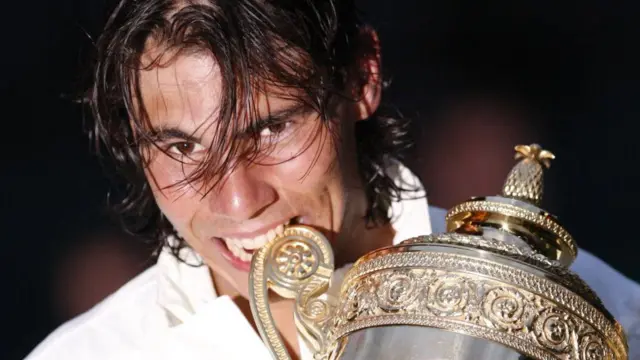
image source, Getty Images
The exceptional career of Spanish tennis player Rafael Nadal (38 years old) ended on Tuesday evening, after Spain lost to the Netherlands in the Davis Cup on an emotionally charged Spanish night.
Nadal retires as the second most successful men’s singles player in the history of the game, in terms of the number of titles in the four major tournaments, behind his only competitor in recent years, Serbian Novak Djokovic.
The Spaniard, who won 22 titles in the four major tennis tournaments, had stated some time ago that this Spanish tournament would be the last in his career.
“The truth is that no one ever wants to get to this point,” Nadal told the audience after the end of his 20-year professional career. “I’m not tired of playing tennis, but my body doesn’t want to play anymore and one has to accept that.” He continued: “I feel very privileged. I have been able to turn my hobby into my profession for a long time.”
Many remained in the stadium, which has a capacity of about 11,500 people, after the match ended and chanted “Rafa, Rafa” one last time. Before they gave a standing ovation when Nadal appeared again to give his farewell speech, they applauded him for a continuous minute.
Nadal tried to hold back his tears after finishing his emotional speech, while his wife, Miri, his son, Rafael Junior, his parents, and his sister, Maribel, were in the audience.
The next part of the farewell celebration featured the most prominent stars of tennis and other sports, through video clips expressing what Nadal means to them. Among them were tennis stars Roger Federer, Novak Djokovic, Serena Williams and Andy Murray, and football players David Beckham, Andres Iniesta and Raul, in addition to a player. Golf Sergio Garcia.
“King of the dirt”
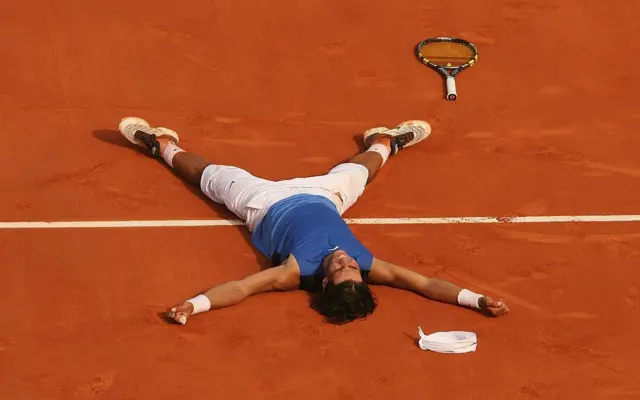
image source, Getty Images
Nadal, known as the “King of Clay Courts”, won the French Open men’s singles title a record 14 times and won 112 of the 116 major matches he played at Roland Garros.
No other player has won so many Grand Slam singles titles at the same tournament.
Nadal is also a four-time US Open champion and has won both the Australian Open and Wimbledon twice.
He also won singles and doubles gold at the Olympic Games and helped Spain win the Davis Cup finals four times, most recently in 2019. He also played a role in his country’s victory in 2008, although injury prevented him from appearing in the final.
“A good person from Mallorca”
Throughout his long and inspiring career, Nadal was known for his humility, wit, and complete acceptance of his emotions. He did not hide his smiles or his tears much.
Nadal conveyed all of these qualities in his final speech to the crowd, where he joked: “I lost my first match in the Davis Cup, and I lost my last match. And so we closed the circle.”
He added: “The titles and numbers are there and they are clear. Maybe people know that. But the way I would like people to remember me is to remember me as a good person from a small village in Mallorca. I was lucky. My uncle was a tennis coach when I was a very young child and I had a family that supported me.”
He continued, “I was just a kid who followed his dreams and worked as hard as I could to get to where I am today.”
“At the end of the day, honestly, a lot of people work hard and do their best every day, but I was one of the lucky people who was able to have the life I did and have unforgettable experiences,” he added with his usual modesty.
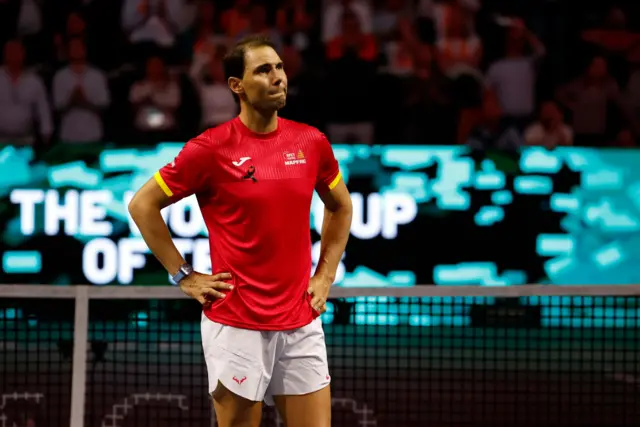
image source, EPA-EFE/REX/Shutterstock
The rough childhood of Nadal and his uncle Toni
Nadal published his autobiography, “Rafa,” in 2011, which he wrote with British journalist John Carlin. It included a lot of information about his upbringing and training, which he began when he was only 4 years old.
Little Rafael’s uncle, Toni, was once among the best Spanish amateur players who participated in the national championships. By the time Rafael was three years old, Tony was coaching hundreds of children at the Manacor Tennis Club on the island of Mallorca.
In an interview with Jonathan Jouriko from BBC Sport, Toni, who coached Nadal, the professional player, until 2017, admitted that he was very harsh on his nephew.
Nadal’s mother, Anna Maria, says that her child would arrive home from his training sessions several times crying, without admitting to her what was bothering him.
Nadal revealed the details of this years later in his autobiography, where he said that his uncle would scream at him and try to intimidate him, and that he would feel a “pain in his stomach” if he discovered that he would be alone in training with him.
He added that if he lost his concentration a little while on the field, his uncle would throw balls at him to get his attention.
At the end of the training session, Toni insisted that Nadal collect all the balls he had thrown at him and wipe off the red dirt, while the other children went home.
If he forgot his water bottle, he had to train without water under the scorching Mallorcan sun.
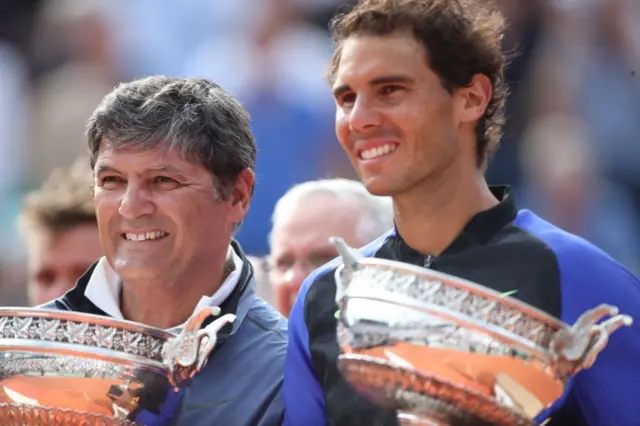
image source, Getty Images
Nadal won the Spanish national under-12 tennis title when he was 11 years old. When he wanted to celebrate his success, his uncle chanted the names of the previous 25 winners. Nadal only knew five of them, and they were those who went on to play professionally.
Toni wanted to tell Nadal that he had “only a one in five chance” of doing the same.
Another example came a few years later when Nadal, then 14 years old, returned home from an international tournament in South Africa.
Nadal explains in his autobiography how a small family party was organized, with a banner bearing a festive message, but he did not have the opportunity to see it, as his uncle Toni tore the banner down from the wall, and prevented Nadal from going to the party.
Rather, he scheduled a training session for him at nine o’clock in the morning the next day.
For his part, Tony tells BBC Sport: “I was tough on him, but I wasn’t too tough. I was tough for his greater good.”
He added: “I was a coach who was more concerned with shaping and strengthening Rafael’s personality than his technical training.”
Rafael, the child, did not like the dark and preferred to sleep with the light on or the television on. He would hide under the pillows whenever a thunderstorm occurred.
Rafa was later known during his career as having a “raging bull” personality, characterized by endurance, intensity, cruelty, and a refusal to accept defeat, a personality believed to have been built by Uncle Tony.
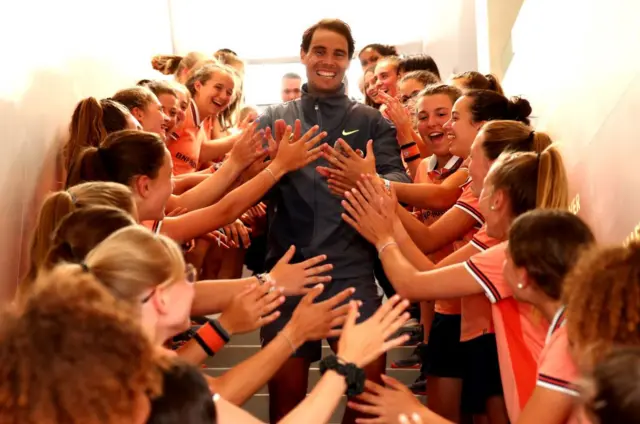
image source, Getty Images
What if he doesn’t get sick?
In 23 years, Nadal missed 11 major tournaments due to injuries and various health conditions.
Many people always ask what would have happened if he had participated in all of them, or at least some of them, and his body had not failed him several times during his career.
What many people may not know is that Nadal has suffered from patellar tendonitis in both knees since he was 21 years old, which exposed him to many injuries and pains during his career, especially in his left foot.
He has also been suffering since 2005, the same year in which he won his first French Open title, from a rare disease called “Müller-Weiss Syndrome,” which is a rare condition that affects the scaphoid bone, i.e. the ankle bone in adults, which is one of the most important bones in the human foot.
There is no cure for this syndrome.
In 2022, in statements to the newspapers “AS” and “L’Equipe” in Melbourne after the Australian Open, Nadal said: “We have known for several years that this is incurable, so anything (treatment) we tried was just an attempt to relieve the pain.” So I can keep playing.”
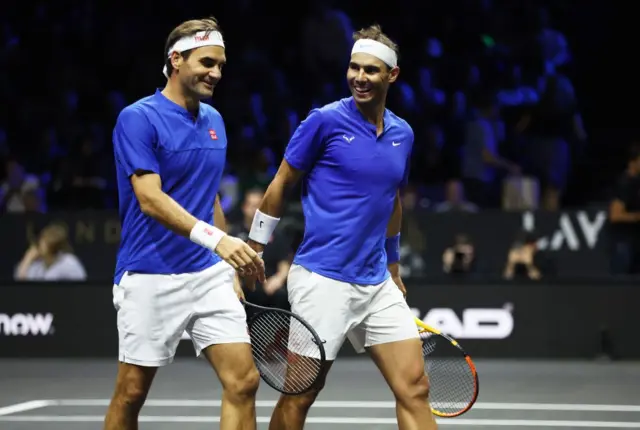
image source, Getty Images
In the same year, Nadal won his fourteenth title at Roland Garros in France, extending his record without feeling in his left foot.
He said: “I did not have any sensation in my feet, because my doctor injected me with anesthetic injections on the nerves. This removes the feeling in my feet.”
He added at the time that he would not repeat this experience again and that he would not play a match like this again if he had to be injected with the drug in this way.
Many believe that the best match Nadal played was the 2008 Wimbledon final against his arch-rival Roger Federer, with whom he has a strong and inspiring friendship.
Former American tennis player John McEnroe went so far as to say that it was “the greatest match ever played” in the history of the game.
ظهرت في الأصل على www.bbc.com
